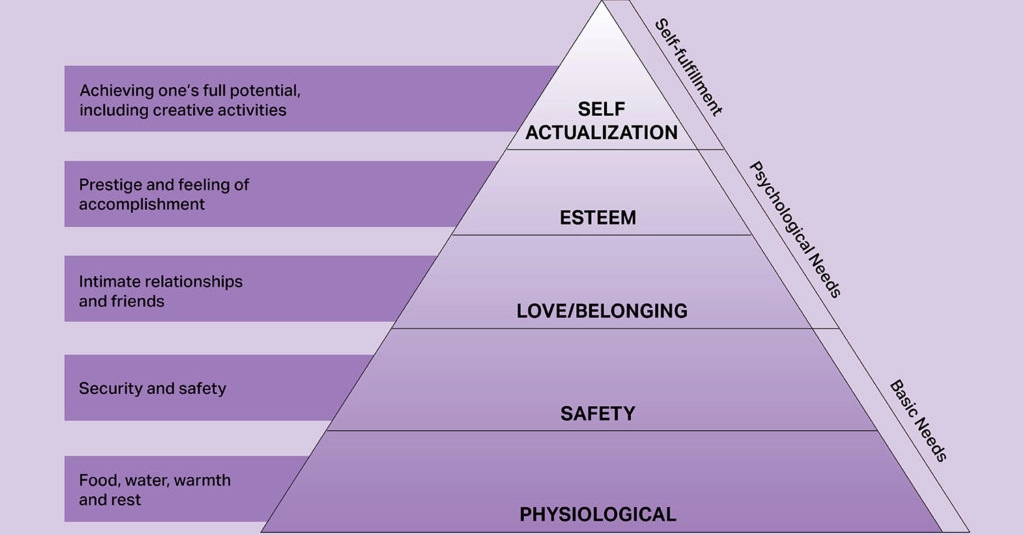Do you sometimes look at other people in your life and wonder how they keep everything together while maintaining a generally impressive level of awesome? According to psychological theorist Abraham Maslow, these special folks are working toward being self-actualized.
You may have heard of Maslow’s “hierarchy of needs.” The hierarchy is often depicted as a pyramid with five levels. At the bottom are physiological needs; one level up is safety needs, followed by belongingness and love, esteem, and self-actualization at the top.
]According to Maslow’s theory, each of these needs motivates us to behave in certain ways. For example, physiological needs will drive us to make dinner or take a nap, and belongingness needs will make us pick up the phone to plan a hangout with a friend. According to Maslow’s theory, the needs at the bottom of the pyramid must be satisfied before a person can move up to the next level.
David Watson, a psychology professor at MacEwan University, says theories like Maslow’s were a departure from the two main psychological models used up until around the 1950s. “[People] found it a refreshing change compared to the pessimism and determinism of Freud, and the environmental determinism of behaviourism,” says Watson. Maslow, like other positive psychologists, believed that we are motivated by more than our primal urges, our environments, and the basic need to survive. “Maslow says it’s more than that,” says Watson. “We also have to fulfill our potential, not just control our animal instincts the best we can.”
The four lower levels in Maslow’s pyramid relate to our more basic needs, while the top level—self-actualization—is all about internal growth.
“In terms of the self-actualizing notion, it is kind of a tall order. [Maslow] thought only maybe one per cent [of the population] was ever fully there,” says Watson. Maslow developed a 15-point list of criteria for self-actualization by conducting case studies of famous individuals, including Albert Einstein and Mother Teresa, whom he believed were self-actualized. The criteria list covers a variety of characteristics, ranging from being spontaneous and able to see the world outside of one’s subjective experience to caring about human welfare. “It isn’t just achievement in one area that’s enough to be fully self-actualized,” explains Watson.
Since its inception, the validity of the model has been challenged. A recent Psychology Today article called “Social Network: What Maslow Misses,” by Pamela B. Rutledge, suggests that Maslow’s hierarchy downplays the importance of social connection and community, and argues that non-hierarchical models of motivation are more appropriate.
Maslow’s research methods have also been questioned. “A criticism of Maslow is that it’s kind of a quaint, armchair speculation about what a human being could be like,” says Watson.
The theory’s cross-cultural universality is also questionable. “Maslow’s approach implies some sort of independent, autonomous individual, going off on their own path and going against the grain of their society,” says Watson. “That fits in with an individualistic society like the United States, which is very high on individualism versus collectivism, but does it work somewhere else?”
Maslow first introduced his paper “A Theory of Human Motivation,” which included his proposed hierarchy of needs, back in 1943, but he wasn’t the only one thinking along these lines. Watson says that Carl Rogers, another positive psychologist, developed therapeutic methods for helping clients be the best they could be. In more modern times, Mihaly Csikszentmihalyi’s book Flow alludes to Maslow’s concept of peak experience. Mindfulness is another emerging area of research. “There’s been a lot of stuff with mindfulness as a method towards better well-being and attitude — about being in the present moment, experiencing the present moment, be it good, bad, or whatever it is,” says Watson.
If Maslow’s statistics are right, most of us will never be fully self-actualized. Thankfully, according to positive psychology, everyone has the potential to be uniquely awesome. If you’re into personal growth, or even looking for a little boost, then integrating mindfulness or other positive practices into your daily routine can’t hurt.





0 Comments